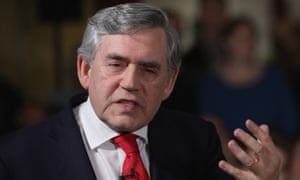
Gordon Brown has demanded that Rupert Murdoch’s takeover of the Sky satellite business be delayed until the government carries out the second part of the Leveson inquiry into press malpractice.
In a letter to the culture secretary, Karen Bradley, the former prime minister said the bid by Murdoch-controlled 21st Century Fox for Sky made the “promised but delayed second part of the Leveson inquiry … particularly relevant and timely”.
Leveson part two was designed to investigate the relationship between the press and the police, in particular the close relationship between senior officers of the Metropolitan police service and executives and journalists at the Murdoch-owned News International, which publishes the Sun and the Times and used to publish the News of the World.
It was delayed in 2011 until the conclusion of all related criminal cases to avoid prejudicing any police investigations or court proceedings. In one of those trials, the former News of the World editor Andy Coulson was sent to jail for phone-hacking offences for 18 months in 2014.
Having given evidence to the first part of the Leveson inquiry, Brown says that evidence of wrongdoing beyond phone hacking has still not been properly investigated. “It’s very important that this is aired now,” he told the Guardian.
In his letter to Bradley, Brown argues that there is a “new body of evidence” about the extent of abuses beyond voicemail interception, which include impersonation or “blagging”, email hacking, burglary and unauthorised access to confidential records, and make the need for the promised follow-up “unanswerable”.
The new information cited by Brown in his letter has been gathered by the investigative journalist Peter Jukes and Hacked Off, which acts for victims of press abuse. It is expected to be submitted to the Department for Culture, Media and Sport on Wednesday. It includes fresh evidence involving Mazher Mahmood, the undercover reporter currently serving a 15-month sentence after being found guilty of tampering with evidence in the collapsed drug trial of the singer Tulisa Contostavlos.
Brown writes: “Mainly because they were subject to ongoing police inquiries in 2011 and 2012, abuses beyond voicemail interception were either excluded from consideration in the first part of the inquiry or underexamined. As yet, none of the legal or corporate governance issues raised by __more than 20 trials have been assessed.
“Again, the fresh evidence made available raises as yet unanswered claims about wrongdoing that have to be investigated in the public interest.
“It is clear that, given these questions, the Leveson 2 inquiry should take place in advance of any final decision related to the future of Sky TV.”
Last week Murdoch’s 21st Century Fox, which owns the Fox News TV channel and Fox film studio, proposed to buy the 61% of Sky it does not already own for £11.2bn. Five years ago a similar bid by Murdoch collapsed amid public revulsion at the height of the phone-hacking scandal, although on this occasion the mogul’s newspapers sit in a separate company, News Corporation.
It emerged during the phone-hacking scandal that Brown had been targeted by journalists at News International for __more than 10 years, both as chancellor of the exchequer and prime minister, by repeated attempts to access his voicemail and obtain confidential information.
Bradley launched a consultation exercise on whether to launch part two of the Leveson inquiry in November, citing the costs involved and the fact that the first part had brought about changes in the industry as reasons for the review. She is due to announce the result of that consultation on 10 January.
The culture secretary also has to decide, if the takeover is confirmed, whether to issue a public interest intervention notice so that Ofcom can examine if the takeover should be subject to conditions because it would impact on media plurality in the UK.
Under the Broadcasting Act 1990, Ofcom, the media regulator, also has an ongoing duty to ensure holders of broadcasting licences pass a “fit and proper” test. In 2011 it concluded that Sky was a “fit and proper” company to hold a broadcasting licence but criticised James Murdoch, then head of the newspaper business and now chief executive of Fox. Ofcom said his actions during the hacking scandal “repeatedly fell short” of what was expected. News Corp defended his record at the time, and no objections were made when Murdoch was reappointed as chairman of Sky earlier this year.